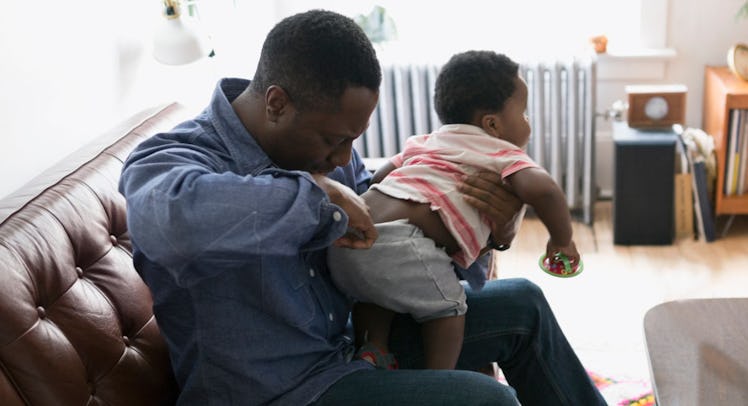Diaper Changing Is Every Parent’s Dirtiest Job. Here’s How to Clean It Up.
Bet you never imagined you'd be cleaning poop out of curtains, but here we are.

The following was produced in partnership with Lysol. Lysol Laundry Sanitizer kills 99.9% of bacteria detergents leave behind and works even in cold water, helping parents keep their homes clean and disinfected throughout every unpredictable diaper changing moment.
Charles Gerba is an esteemed environmental microbiologist who, among other things, served on the Science Advisory Board of the EPA for nine years, coined the term “toilet plumes,” and wrote the book on both microbiology and pollution science. So what does a guy like that have to say about changing babies? “Poop is pretty bad.” An oversimplification? Maybe. A simple truism parents too often learn the hard way? Definitely.
So how can parents be sure they’ve eradicated every last trace, even after the most epic, “I never thought I’d have to clean poop out of curtains” blowout? Again, Dr. Gerba has an answer: “You gotta wipe up all the poop all the time.”
There are some very good reasons for this, but prime among them is the presence of dangerous bacteria and other contaminants like rotavirus, norovirus, salmonella which can quickly spread from surfaces to babies, other family members, or you. “Any debris left anywhere on a changing table or piece of clothing can become a breeding ground,” says Dr. Jennifer Trachtenberg, a fellow of the American Academy of Pediatrics.
First, pay attention to the diapers. Disposable diapers require a garbage can or pail that fully encloses them so you don’t have to touch anything. Even then, you need to disinfect the whole setup regularly. “Even if you just touch the side of a pail and you don’t see anything there, you can contact germs and pass them on,” says Dr. Trachtenberg.
Cloth diapers are an entirely different ball game. “The hardest things to get viruses out of are soiled diapers and towels,” Gerba says. “You have to use really hot water and dry laundry completely to get it truly clean.” He suggests that the hot water setting combined with a full hot dryer cycle or line drying with full sun exposure to best eliminate residual germs. An additive like Lysol Laundry Sanitizer can help do extra work needed for cloth diapers and can kill the bacteria in both cold and hot water.
Still, any bacteria on a piece of laundry can easily transfer to everything it touches, and moving those items from the washer to the dryer results in bacteria on parents’ hands. That’s why the doctors recommend washing diapers completely separately — ditto for other articles that become soiled like blankets, changing pad and mattress covers, baby clothes, or your clothes (it’ll happen) — then washing hands thoroughly before moving on to the general family laundry. Yeah, we know doctors can get overzealous about hand washing, but here they have a point.
Regardless of the type of diaper used, the changing table will be the “hot zone” of the family home. It’s a terrible place but an unavoidable one, so the only thing to do is chip away at the microscopic menace with a cleaner and disinfectant. “You should disinfect after every use of a changing table or surface and every diaper change,” says Gerba. “This protects you and the child. Otherwise, you get a buildup of organisms that can be passed in both directions.” And, of course, follow the laundry guidelines above to thoroughly clean your child’s clothes, your clothes, the changing pad cover, the pad itself, and any other potentially soiled articles.
As a general rule, Gerba recommends using disposable diaper clean-up products like wipes and paper towels as much as possible, especially for kids under two years old, who are big-time poop machines.
Even if you manage to keep your kid’s bottom sparkling clean, there’s no accounting for the other kids’ bums. Be sure to clean and disinfect after any play date with other children and take care to fully clean surfaces that might be used for changing one kid after another. And — it can’t be stressed enough — make sure clothes worn during play dates, as well as towels, sheets, or anything else kids have touched and rolled on, get Dr. Gerba’s recommended full laundry treatment.
Do all that, and you can rest assured that your child and family are safe from the vast majority of viral invaders. Sure, there’s always more poop, but there’s also always a way to make the one part of parenting that definitely stinks just a bit better.